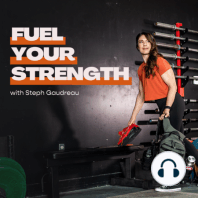47 min listen
Is Body Positivity for You?
ratings:
Length:
31 minutes
Released:
Feb 16, 2021
Format:
Podcast episode
Description
There is a big difference between feeling positive about your body and the body positivity movement, but it can be a very nuanced topic to understand. While diet culture is part of a more extensive set of oppressive systems to people with marginalized identities, the body positivity movement has moved so far away from how it started. Social justice and body positivity are heavily intersected, and it takes some time to unpack just how deeply that runs in our society. Key Takeaways If You Want To Understand The Difference Between Body Positivity and the Body Positivity Movement, You Should: Educate yourself about the history of the body positivity movement Understand the systemic ways that people in marginalized bodies are oppressed Unfollow anyone who is co-opting the body positivity movement with disproportionate motivations The Difference Between Body Positivity and Systemic Oppression The body positivity movement has started to center around people who don’t represent the individuals that this movement was really created by and for. Although originally created for people in marginalized bodies, we have seen a change in the ‘face’ of body positivity shifting away from marginalized bodies and towards others that are co-opting the movement. While it is still totally possible and common for people in straighter size bodies to dislike their bodies and relationships with food, it is not the same as experiencing the kind of systemic discrimination and oppression that people in larger bodies experience every single day. What You Can Do To Stop the Co-Opting There is still judgment for people in larger bodies who embrace the body positivity movement in the same way that people in non-marginalized bodies do. By being clearer and discerning with the terms that we use on social media and in real life, we can stop the systematic oppression found in the body positivity movement and start including the people who might not look like you. With some learning, some listening, and some questioning, you can start to peel back the layers of the body positivity onion and understand the time and place of these hard things. How are you going to dig deeper into the differences between body positivity, fatphobia, and the systemic oppression of marginalized bodies? Share your thoughts with me in the comments on the episode page. In This Episode A brief history of the body positivity movement and why you shouldn’t co-opt it if you are in a straight size body (5:54) How social media has impacted the body positivity movement and plays into oppressive narratives (14:35) The difference between systemic oppression and discrimination because of the body that you are in (17:58) How movements aimed at people with marginalized bodies are being subsumed by people who they were not designed for (20:20) Suggestions to help you be more clear and discerning around your understanding of body positivity (24:27) Quotes “It is kind of important to bring up this idea of co-opting, and how it removes the emphasis away from the people or the concepts that it was really designed to support.” (7:52) “You start to see that predominantly thin, white, young, cisgender people who are being featured as the ‘faces’ of body positivity. And that is so different from the origins of the fat acceptance movement.” (15:46) “What I am trying to say in this episode is that yes, you may have negative feelings about your body. Even if your body is very thin, you may still have body dysmorphia, you could still have an eating disorder, you could still have disordered eating, you could still not like your body. But it’s still not the same as experiencing the kind of systemic discrimination and oppression that people in larger bodies experience every single day.” (19:10) “There is a difference between feeling bad about your body and experiencing systemic discrimination.” (22:23) “I don’t want you to just listen to me; I want you to really go seek out and follow and listen to people wh
Released:
Feb 16, 2021
Format:
Podcast episode
Titles in the series (100)
Lift Like a Girl with Girls Gone WOD: Joy and Claire of Girls Gone WOD have been on my radar for years. They’re the women talking about women’s issues in the gym, and everything from sports bras to anxiety is fair game. What I like most about them is that they never take themselves too se by Fuel Your Strength
